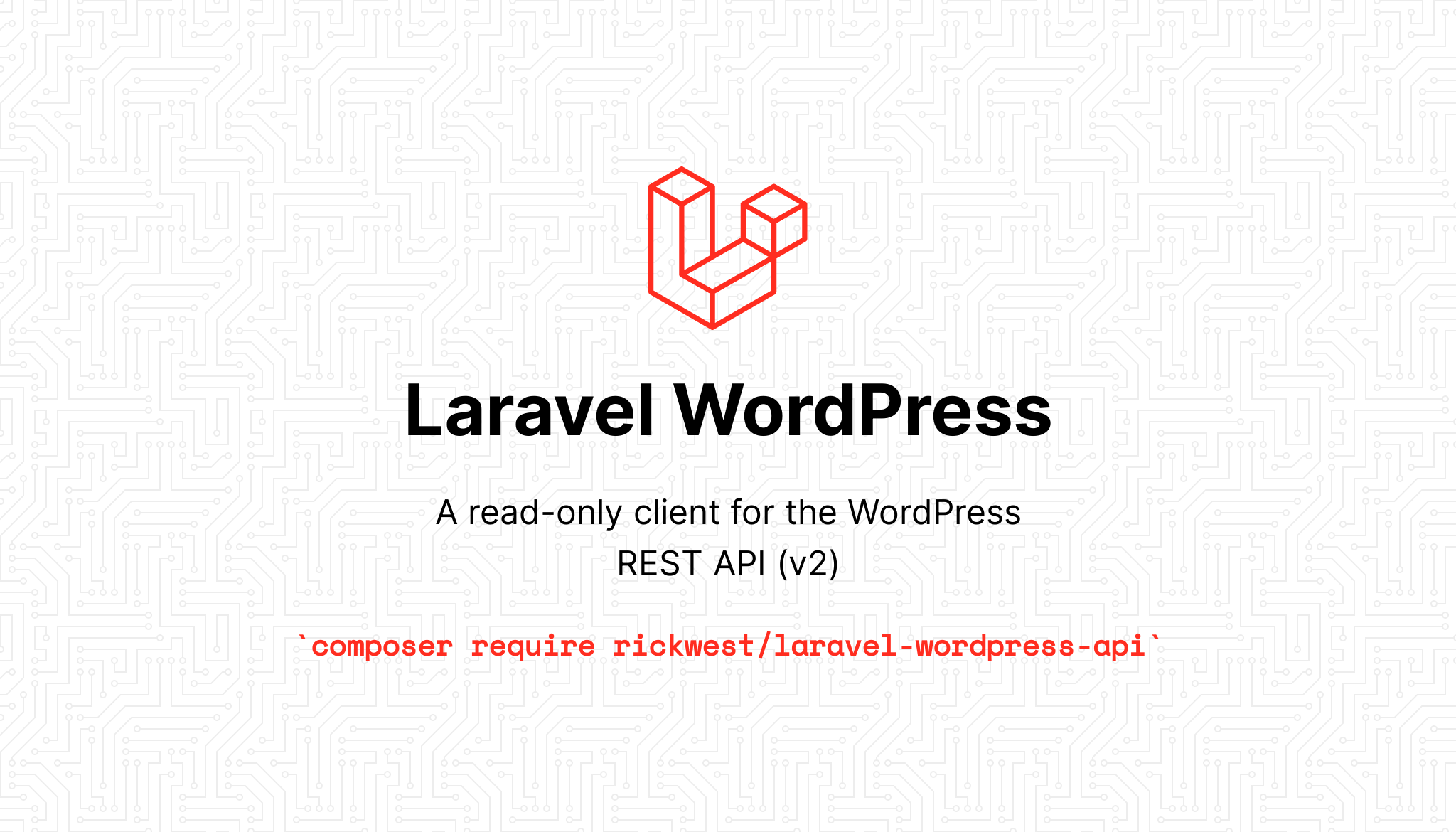rickwest / laravel-wordpress-api
A Laravel read-only client for the WordPress REST API (v2)
Installs: 11 838
Dependents: 1
Suggesters: 0
Security: 0
Stars: 37
Watchers: 3
Forks: 14
Open Issues: 5
pkg:composer/rickwest/laravel-wordpress-api
Requires
- php: ^8.1|^8.2
- illuminate/contracts: ^9.0|^10.0|^11.0|^12.0
- spatie/laravel-package-tools: ^1.9.2
Requires (Dev)
- friendsofphp/php-cs-fixer: ^3.8
- guzzlehttp/guzzle: ^7.4
- nunomaduro/collision: ^6.0|^7.0|^8.0
- nunomaduro/larastan: ^2.0.1|^3.0
- orchestra/testbench: ^7.0|^8.0|^9.0|^10.0
- phpstan/extension-installer: ^1.1
- phpstan/phpstan-deprecation-rules: ^1.0|^2.0
- phpstan/phpstan-phpunit: ^1.0|^2.0
- phpunit/phpunit: ^9.5|^10.0|^11
- spatie/laravel-ray: ^1.26
This package is auto-updated.
Last update: 2026-02-12 03:54:18 UTC
README
An unambitious read-only client for the WordPress REST API (v2). This package is the by-product of a side project, having found that I wanted a more expressive, fluent, Laravel-esque way of querying the WordPress API.
// Without the package 👎 Http::get('https://example.com/wp-json/wp/v2/posts', [ 'search' => 'potatoes', '_embed' => 1, 'orderby' => 'date', 'order' => 'desc' '_fields' => 'title', ]); // Using the package 👌 WordPress::posts() ->search('potatoes') ->embed() ->latest() ->get('title');
As well as the fluent query builder, you also benefit from a nicely formatted response, including pagination information.
// Without the package 👎 $response = Http::get('https://example.com/wp-json/wp/v2/posts'); $data = $response->json(); $pages = $response->header('X-WP-TotalPages'); $total = $response->header('X-WP-Total'); // Using the package 👌 $posts = WordPress::posts()->get(); // $posts [ 'data' => [...], 'meta' => [ 'pages' => 1, 'total' => 10, ], ],
Installation
You can install the package via composer:
composer require rickwest/laravel-wordpress-api
Then you need to add your WordPress url to your .env file:
WORDPRESS_URL=https://example.com
Usage
This package binds a singleton to the Laravel service container, so you can easily resolve the WordPress client directly from the container, or via dependency injection. Alternatively, the package also exposes both a Facade and a helper function should you prefer a shorter more expressive option.
Currently, the package has support for the following WordPress resources: categories, comments, media, pages, posts, users. Adding support for further resources is really easy, but these are the only ones that I need for now! For a list of all available resources please see https://developer.wordpress.org/rest-api/reference. I'm happy to accept PR's for any additions.
// Resolve service directly from container and access the Posts API app(WordPress::class)->posts(); // Resolve via Facade and access the Posts API WordPress::posts(); // Resolve service via helper and access the Posts API wordpress()->posts(); // Supported resources WordPress::categories(); // Access the Categories API WordPress::comments(); // Access the Comments API WordPress::media(); // Access the Media API WordPress::pages(); // Access the Pages API WordPress::posts(); // Access the Posts API WordPress::users(); // Access the Users API Wordpress::tags(); // Access the Tags API Wordpress::plugins(); // Access the Plugins API // You can also access resources as properties wordpress()->posts
Retrieve a single resource
Call the find method on a resource class in order to get a single resource by ID:
WordPress::posts()->find(1); // All WordPress resources share a handful of global parameters. https://developer.wordpress.org/rest-api/using-the-rest-api/global-parameters/ // You can use the relevant fluent builder methods to add these to your query WordPress::posts()->embed()->fields('title')->find(1); // Some resources also accept a limited number of resource specific parameters. These can be passed as a second argument to the find method WordPress::posts()->find(1, ['password' => 'pa55w0rd']);
Retrieve a collection of resources
Call the get method on a resource to retrieve a collection of resources. The response you receive can be controlled and filtered using various parameters, https://developer.wordpress.org/rest-api/reference/.
This package provides some fluent builder methods in order to easily and expressively build your desired query. Collection responses are then nicely formatted and include useful pagination information.
WordPress::posts()->get(); // All WordPress resources share a handful of global parameters, https://developer.wordpress.org/rest-api/using-the-rest-api/global-parameters/, // along with a number of filtering, ordering and pagination options. You can use the relevant fluent builder methods to build your query. WordPress::posts() ->embed(array|string $relations) // Embed linked resources into response. Reduces need for extra HTTP requests for related resources ->fields(array|string $fields) // Specify a subset fields to return in a response ->with(array|string $fields) // Alias for fields method above ->page(int $page) // Current page of the collection ->perPage(int $perPage) // Maximum number of items to be returned in result set ->search(string $term) // Limit results to those matching a string ->offset(int $offset) // Offset the result set by a specific number of items ->exlclude(int|array $ids) // Ensure result set excludes specific IDs ->inlude(int|array $ids) // Limit result set to specific IDs ->orderBy(string $field, string $direction) // Sort collection by object attribute, either ascending or descending // Resources with authors ->author() // Limit result set to resources assigned to specific authors ->authorExclude() // Ensure result set excludes resources assigned to specific authors // Resources with dates ->after(Carbon $after) // Limit response to resources published after a given ISO8601 compliant date ->before(Carbon $before) // Limit response to resources published before a given ISO8601 compliant date ->latest() // Order by date, descending ->oldest() // Order by date, ascending // Resources with slugs ->slug(string $slug) // When a utility doesn't exist for the parameter ->parameter(string $key, mixed $value) // Add a custom parameter to the query // Send it! ->get(); // Conditionally adding parameters WordPress::posts() ->when($onlyIncludeTitle, function($query) { $query->fields('title'); }) ->get();
Creating, updating and deleting resources
Whilst this package is primarily intended for reading data from the WordPress API, it is possible to perform write operations using the send method on a resource class.
WordPress::posts()->send(string $method, int $id, array $options); // For example, updating a post might look like... WordPress::posts()->send('POST', 1, [ 'json' => ['title' => 'My New Title'], ]);
Testing
composer test
Changelog
Please see CHANGELOG for more information on what has changed recently.
Contributing
Please see CONTRIBUTING for details.
Security Vulnerabilities
Please review our security policy on how to report security vulnerabilities.
Credits
License
The MIT License (MIT). Please see License File for more information.

